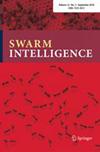一种简化的多目标粒子群算法
IF 2.1
4区 计算机科学
Q3 COMPUTER SCIENCE, ARTIFICIAL INTELLIGENCE
引用次数: 2
摘要
粒子群优化是一种流行的自然启发的元启发式算法,在过去的二十年中被广泛用于解决单目标和多目标优化问题。近年来,粒子群算法中引入了局部和全局搜索策略、学习策略和参数自适应策略来提高算法的性能。这些方法中的大多数都增加了用户定义参数和算法步骤的数量,从而增加了算法的复杂性。本文提出了一种简化的多目标粒子群优化算法,通过对实编码精英非支配排序遗传算法和粒子群优化算法中相似算子的详细定性分析,简化了开发(引导)和探索(随机)操作。在30个知名基准问题上对该算法进行了定量测试,并与实编码精英非支配排序遗传算法、模拟二元跳跃基因算子和多目标非支配排序粒子群优化算法进行了比较。通过比较,发现所提出的算法在收敛速度上具有优势。在扩展的比较分析中,发现该算法对于最近的四种多目标粒子群优化算法和四种差分进化变体具有更好的性能。最后,将该方法应用于一个新制定的工业渣油(原油蒸馏装置的底产物)催化裂化装置的多目标优化问题,结果表明该方法比其他比较算法具有更好的性能。本文章由计算机程序翻译,如有差异,请以英文原文为准。
A simplified multi-objective particle swarm optimization algorithm
Particle swarm optimization is a popular nature-inspired metaheuristic algorithm and has been used extensively to solve single- and multi-objective optimization problems over the last two decades. Several local and global search strategies, and learning and parameter adaptation strategies have been included in particle swarm optimization to improve its performance over the years. Most of these approaches are observed to increase the number of user-defined parameters and algorithmic steps resulting in an increased complexity of the algorithm. This paper presents a simplified multi-objective particle swarm optimization algorithm in which the exploitation (guided) and exploration (random) moves are simplified using a detailed qualitative analysis of similar existing operators present in the real-coded elitist non-dominated sorting genetic algorithm and the particle swarm optimization algorithm. The developed algorithm is then tested quantitatively on 30 well-known benchmark problems and compared with a real-coded elitist non-dominated sorting genetic algorithm, and its variant with a simulated binary jumping gene operator and multi-objective non-dominated sorting particle swarm optimization algorithm. In the comparison, the developed algorithm is found to be superior in terms of convergence speed. It is also found to be better with respect to four recent multi-objective particle swarm optimization algorithms and four differential evolution variants in an extended comparative analysis. Finally, it is applied to a newly formulated industrial multi-objective optimization problem of a residue (bottom product from the crude distillation unit) fluid catalytic cracking unit where it shows a better performance than the other compared algorithms.
求助全文
通过发布文献求助,成功后即可免费获取论文全文。
去求助
来源期刊

Swarm Intelligence
COMPUTER SCIENCE, ARTIFICIAL INTELLIGENCE-ROBOTICS
CiteScore
5.70
自引率
11.50%
发文量
11
审稿时长
>12 weeks
期刊介绍:
Swarm Intelligence is the principal peer-reviewed publication dedicated to reporting on research
and developments in the multidisciplinary field of swarm intelligence. The journal publishes
original research articles and occasional review articles on theoretical, experimental and/or
practical aspects of swarm intelligence. All articles are published both in print and in electronic
form. There are no page charges for publication. Swarm Intelligence is published quarterly.
The field of swarm intelligence deals with systems composed of many individuals that coordinate
using decentralized control and self-organization. In particular, it focuses on the collective
behaviors that result from the local interactions of the individuals with each other and with their
environment. It is a fast-growing field that encompasses the efforts of researchers in multiple
disciplines, ranging from ethology and social science to operations research and computer
engineering.
Swarm Intelligence will report on advances in the understanding and utilization of swarm
intelligence systems, that is, systems that are based on the principles of swarm intelligence. The
following subjects are of particular interest to the journal:
• modeling and analysis of collective biological systems such as social insect colonies, flocking
vertebrates, and human crowds as well as any other swarm intelligence systems;
• application of biological swarm intelligence models to real-world problems such as distributed
computing, data clustering, graph partitioning, optimization and decision making;
• theoretical and empirical research in ant colony optimization, particle swarm optimization,
swarm robotics, and other swarm intelligence algorithms.
 求助内容:
求助内容: 应助结果提醒方式:
应助结果提醒方式:


